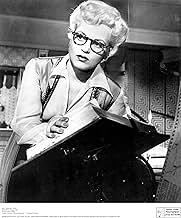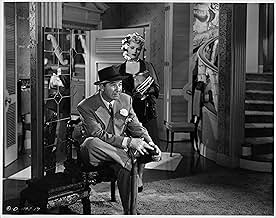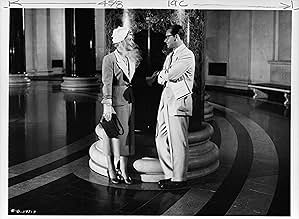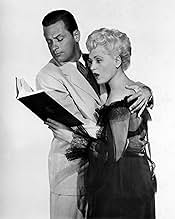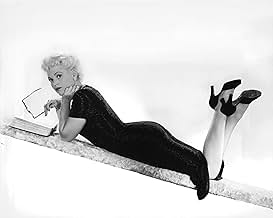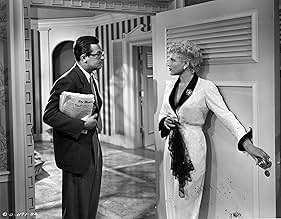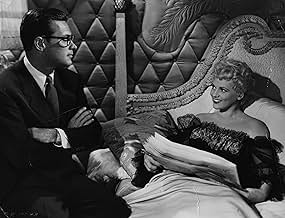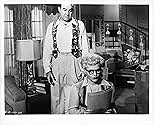Un magnat engage un tuteur pour enseigner à son amant la bonne étiquette, avec des résultats inattendus.Un magnat engage un tuteur pour enseigner à son amant la bonne étiquette, avec des résultats inattendus.Un magnat engage un tuteur pour enseigner à son amant la bonne étiquette, avec des résultats inattendus.
- A remporté 1 oscar
- 5 victoires et 10 nominations au total
Chet Brandenburg
- Hotel Worker
- (uncredited)
Charles Cane
- Policeman
- (uncredited)
Helen Eby-Rock
- Manicurist
- (uncredited)
Mike Mahoney
- Elevator Operator
- (uncredited)
Paul Marion
- Interpreter
- (uncredited)
William Mays
- Bellboy
- (uncredited)
John Morley
- Native
- (uncredited)
David Pardoll
- Barber
- (uncredited)
Bhogwan Singh
- Native
- (uncredited)
Histoire
Le saviez-vous
- AnecdotesTo help build up Judy Holliday's image, particularly in the eyes of Columbia Pictures chief Harry Cohn, Katharine Hepburn deliberately leaked stories to the gossip columns suggesting that her performance in Madame porte la culotte (1949) was so good that it had stolen the spotlight from Hepburn and Spencer Tracy. This got Cohn's attention and Holliday won the part in Quand l'esprit vient aux femmes (1950).
- GaffesIn the final scene of the movie Billie and Paul are pulled over by a motorcycle cop. There are three shots, one of them driving to the curb, one of them talking to the officer, and then driving away. The officer who talks to them is obviously much older (and bigger) than the thin young man in the first and third shots.
- ConnexionsFeatured in Film Preview: Episode #1.2 (1966)
- Bandes originalesSymphony No. 2 in D Major, Op. 36, 2nd movement
(uncredited)
Music by Ludwig van Beethoven
Played at the outdoor concert
Also played on the phonograph
Commentaire en vedette
Any play that runs 1642 performances on Broadway for three years you know will wind up in Hollywood. But usually the Broadway cast never makes it intact.
It didn't here, but we were lucky to get Judy Holliday to repeat her acclaimed Broadway role her as Billie Dawn, gal pal of junk tycoon Broderick Crawford. Judy only got the role because Rita Hayworth decided to marry Aly Khan and after testing several others who weren't quite right Harry Cohn decided to go with the original. She rewarded Cohn's late faith with a Best Actress Oscar for 1950.
Speaking of Oscars, Cohn had an interesting problem on his hands which he solved with Born Yesterday. Broderick Crawford had brought home an Oscar the year before for All the King's Men. But Crawford was hardly traditional leading man material. But there sure were enough similarities with the dictatorial minded Willie Stark with the tyrannical Harry Brock so that Cohn could cast Crawford and keep the momentum going for his career. Crawford's part was played by Paul Douglas on stage who would get to Hollywood right around this time as well.
Still neither Holliday or Crawford were box office and Columbia needed one name that had some guaranteed pull with movie audiences. That's where Bill Holden came in. The part was built up from the Broadway version, all that tourist business at the Capitol and other Washington sites were not on Broadway. The role of the intellectual newspaper reporter was played by Gary Merrill and Merrill was certainly better suited for the part than Holden. Personally I think that Cohn should have gone with his other reliable leading man, Glenn Ford in this part. Still even with the built up role Holden was a definite number three in this film.
The plot is very simple, the magic of Born Yesterday is watching Holliday's character grow in awareness of what's around her. She's the play thing of junk tycoon Harry Brock, a self made millionaire who's street smart, rich, and nothing else. He's aware of it though and aware that Holliday lacks the social graces as well.
Since Crawford can't or won't learn them, at least he wants a polished hostess to make up for it. He hires newspaper reporter Holden to teach Holliday. But he teaches her about democracy and the corrupting influence of special interests of which Crawford is one and she's now aware of.
Crawford also put a lot of his holdings in her name for tax purposes. That's a created situation, Crawford regrets starting.
Holliday became so identified with the Billie Dawn role that when she started having blacklisting problems due to her left wing politics, she went into character as Billie Dawn before Congress. The chumps in Congress actually bought it all and she skated. Actually in real life Holliday was a well read intelligent woman, the last thing from Billie Dawn you could imagine.
Judy Holliday spent the remainder of her career between Broadway and Hollywood so her film output remains small and she died way too young. Still as another uneducated character in a film said, what there is, is cherce.
Born Yesterday is as cherce as it gets.
It didn't here, but we were lucky to get Judy Holliday to repeat her acclaimed Broadway role her as Billie Dawn, gal pal of junk tycoon Broderick Crawford. Judy only got the role because Rita Hayworth decided to marry Aly Khan and after testing several others who weren't quite right Harry Cohn decided to go with the original. She rewarded Cohn's late faith with a Best Actress Oscar for 1950.
Speaking of Oscars, Cohn had an interesting problem on his hands which he solved with Born Yesterday. Broderick Crawford had brought home an Oscar the year before for All the King's Men. But Crawford was hardly traditional leading man material. But there sure were enough similarities with the dictatorial minded Willie Stark with the tyrannical Harry Brock so that Cohn could cast Crawford and keep the momentum going for his career. Crawford's part was played by Paul Douglas on stage who would get to Hollywood right around this time as well.
Still neither Holliday or Crawford were box office and Columbia needed one name that had some guaranteed pull with movie audiences. That's where Bill Holden came in. The part was built up from the Broadway version, all that tourist business at the Capitol and other Washington sites were not on Broadway. The role of the intellectual newspaper reporter was played by Gary Merrill and Merrill was certainly better suited for the part than Holden. Personally I think that Cohn should have gone with his other reliable leading man, Glenn Ford in this part. Still even with the built up role Holden was a definite number three in this film.
The plot is very simple, the magic of Born Yesterday is watching Holliday's character grow in awareness of what's around her. She's the play thing of junk tycoon Harry Brock, a self made millionaire who's street smart, rich, and nothing else. He's aware of it though and aware that Holliday lacks the social graces as well.
Since Crawford can't or won't learn them, at least he wants a polished hostess to make up for it. He hires newspaper reporter Holden to teach Holliday. But he teaches her about democracy and the corrupting influence of special interests of which Crawford is one and she's now aware of.
Crawford also put a lot of his holdings in her name for tax purposes. That's a created situation, Crawford regrets starting.
Holliday became so identified with the Billie Dawn role that when she started having blacklisting problems due to her left wing politics, she went into character as Billie Dawn before Congress. The chumps in Congress actually bought it all and she skated. Actually in real life Holliday was a well read intelligent woman, the last thing from Billie Dawn you could imagine.
Judy Holliday spent the remainder of her career between Broadway and Hollywood so her film output remains small and she died way too young. Still as another uneducated character in a film said, what there is, is cherce.
Born Yesterday is as cherce as it gets.
- bkoganbing
- 14 août 2007
- Lien permanent
Meilleurs choix
Connectez-vous pour évaluer et surveiller les recommandations personnalisées
- How long is Born Yesterday?Propulsé par Alexa
Détails
- Date de sortie
- Pays d’origine
- Langue
- Aussi connu sous le nom de
- Born Yesterday
- Lieux de tournage
- société de production
- Consultez plus de crédits d'entreprise sur IMDbPro
Box-office
- Brut – à l'échelle mondiale
- 12 000 000 $ US
- Durée1 heure 43 minutes
- Couleur
- Rapport de forme
- 1.37 : 1
Contribuer à cette page
Suggérer une modification ou ajouter du contenu manquant

Lacune principale
By what name was Quand l'esprit vient aux femmes (1950) officially released in India in English?
Répondre

